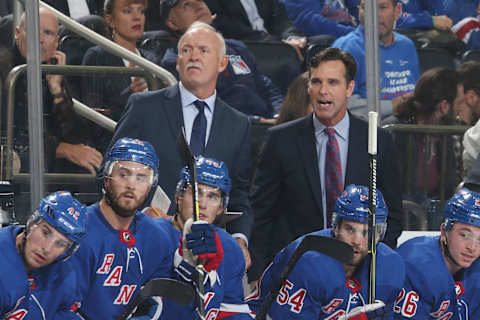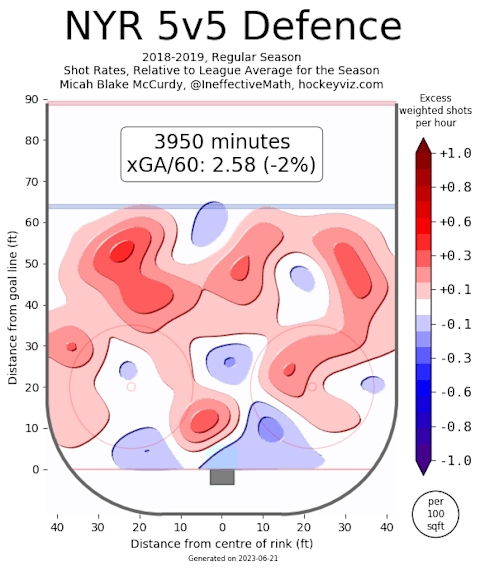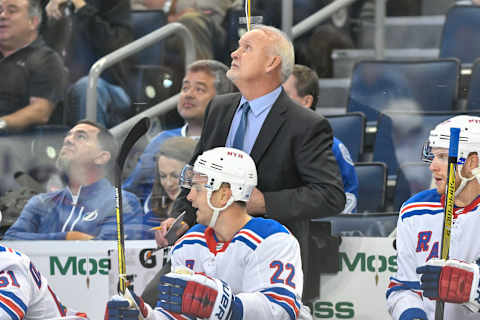New York Rangers: What does history say about Lindy Ruff as a coach?


As the New York Rangers’ organization embarks on an offseason of change, there were calls for a change from Lindy Ruff as the defensive assistant. What does the team’s track record under Ruff show in terms of results?
Whenever a team goes through a dry spell, it is only natural for people to look for scapegoats. Naturally, since it’s easier to replace an individual coach or executive, they’re an easy target for the angry mob. There’s a reason that the hitting or pitching coach is always the first to go on a struggling baseball team. The New York Rangers with Lindy Ruff have drawn the ire of many.
To be fair, the organization fired legendary alumni Jeff Buekeboom from the defensive assistant job following the team’s disappointing second-round exit against the Ottawa Senators. The Rangers’ defensive struggles against an inferior Senators team was extremely frustrating and something that needed to be addressed.
In an attempt to salvage the deteriorating core of the team that made the Stanley Cup final back in 2014, the front office brought in an established and proven coach to take over the defense. The Dallas Stars just missed the postseason for the second straight year and fire their then head coach Lindy Ruff.
This idea raised some eyebrows at the time because of the retread nature of the hire. However, once a coach proves themselves for long enough, organizations will continue to give them chances based on their track record. At face value, the move made sense, the Rangers were a veteran team that expected to be a contender.
While it’s certainly not entirely Ruff’s fault that the Rangers fell off a cliff since his arrival in New York, there is evidence to suggest some correlation. Using expected goals for, a statistic which measures how many goals a team was expected to score based on where the shot came from, we can get an understanding of Ruff’s impact on the team.
In theory, if the Rangers have generated a lower percentage of the expected goals for and conceded a greater number of expected goals against, it would mean that the defense got worse over time.
Related Story. Ruff's time is up. light
To be fair to Ruff, the talent he has to work with is part of the equation and will be given some weight.

Before Ruff
The 2016-2017 Rangers were a talented but flawed team. With the bones of a team that won the President’s Trophy two years earlier, the window of contention to win the Stanley Cup was closed because the miles caught up with the players. During the regular season under Buekeboom, the Rangers were sixth worst in the entire league in expected goals against with 153.
Couple this with an expected goals for percentage of 52.02 percent and the image of a defensive liability is pretty clear. Meaning that since the Rangers were still positive in terms of expected goals for percentage even though the defense was giving up good scoring chances, the offense was good enough to shoulder the load regardless.
The top six for New York that year in terms of games played was Dan Girardi, Ryan McDonagh, Brady Skjei, Nick Holden, Marc Staal and Kevin Klein. This unit was very mediocre at the midway point of the season and compelled Jeff Gorton, the general manager, to trade for Brendan Smith of the Detroit Red Wings at the trade deadline.
The addition of Smith gave the Rangers a bonafide shutdown defenseman that was an elite level shot suppressor.
Yet, even with Smith in the fold and playing well alongside Skjei, the Rangers’ defense struggled in the postseason. The second round exit against the Senators cost Jeff Beuekboom his job as a defensive assistant and spurred a series of changes that offseason.
That same year, the Dallas Stars fired Ruff as head coach for missing the playoffs again and the Rangers brought him in to replace the team legend.

Year one
In year one of the Ruff’s tenure as the Rangers’ coach in charge of defense, the team’s expectations, talent and results did not match. While there was clearly an issue on the back end at the end of the 2016-2017 season, the front office made an effort to redesign the unit. Girardi and Klein were replaced with Kevin Shattenkirk and Tony DeAngelo.
However, these changes didn’t make things any better, in fact, the Rangers defense fell off a cliff. For the entire year, New York finished dead last in Corsi For Percentage with 45.92, meaning that the team only created 45.92 percent of the scoring chances at even strength.
Furthermore, the team’s expected goals against a percentage of 52.6 shows a major struggle. It means that the Rangers were conceding quality scoring chances at an extremely high rate and since those are more likely to be converted into actual goals, it likely meant that the Rangers were losing more.

As the chart from hockeyviz.com shows, the Rangers conceded more than half a shot more than the league average in the area immediately around the net mouth. While part of this can be attributed to head coach Alain Vigneault’s system which was oriented around overloading the puck side of the ice to force a turnover, there was never any adjustment based on talent.
The second half of the season after the trade deadline only made things as McDonagh was traded and several players who didn’t really belong at the NHL level were thrown to the wolves.
Year two was defined by failing to meet expectations at every level, so it’s hard to put the blame squarely on Ruff’s shoulders when the talent at his disposal was not quality. Granted, it’s his job to find a way to make things work with what he has, but this was an extraordinarily bad situation.

Year two
Surprisingly, Ruff survived the 2017-2018 offseason even though Vigneault didn’t. The reasoning likely revolved around David Quinn’s status as a first-time head coach at the NHL level. Conventional wisdom was that there should be a veteran coach on a rookie’s staff to help guide them along and find there way.
Again, the Rangers struggled in 2018-2019 in large part due to defensive lapses. Yes, the forward group was not nearly as talented as the year prior, but the talent on the back end was improved and the results were not there. New York finished bottom ten in the league in expected goals against for the second straight year with 52.52 percent expected goals against average.

Again, there’s a similar picture in terms of talent and result. The Rangers’ defense went through considerable growing pains this past year as players were given major opportunities on a rebuilding team.
Players like Neal Pionk and DeAngelo were given their first serious long-term look at the NHL level. While there were spurts of quality play from both, they both had major issues with consistent play. Of the two, DeAngelo did show signs of improvement over the course of the year, but didn’t ever get his play in his own end of the ice where it needed to be.
To be fair, there was a slight improvement in the team’s defense this past season in comparison to the 2017-2018 season. There was a slightly lower threat percentage according to hockeyviz.com.

Summary conclusion
It’s always far easier for an organization to pin its problems on a single individual. Getting rid of 18 players is far more challenging than firing one coach or executive and spreading out the balance of their contract over several more years. Ruff is a survivor, he’s been a coach in the NHL longer than several franchises have been in existence.
It’s easy to fall back onto the derisive wheel of hockey insiders that swear they know what they’re doing. If someone’s been in the game as long as Ruff has, they will always find a job as long as they want one.
The results through two full seasons as the Rangers’ defensive assistant have been less than stellar. New York’s defense showed marked improvement in year two without a true number one defenseman. Whether the eye test warts that keep popping up are a result of Ruff’s coaching or flawed talent is hard to determine.
Many of the Rangers’ defensive mistakes were mental this past season. Meaning that it’s up to Ruff and the rest of the coaches to better prepare the talent for the situations they’ll be facing in the game and how to react when it happens at full speed.
Ranking the movability of the Rangers' defenseman. dark. Next
At this point, with Ruff surviving the typical staff hiring and firing period, he’s likely to stay at least one more year in New York. Maybe with some better talent and structure, the unit can improve and become a net positive.